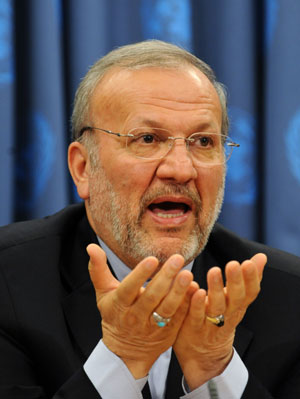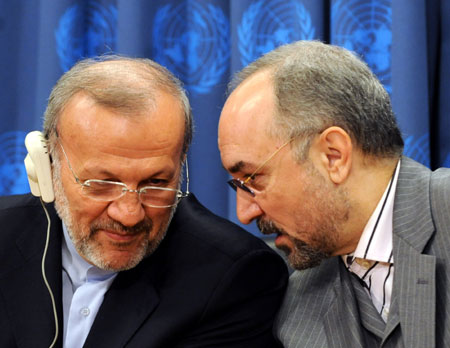Iran talks end with positive results
International talks on the long-standing Iranian nuclear issue concluded on Thursday with positive results, with the Iranians agreeing to open a newly-disclosed nuclear facility to UN inspectors and all parties agree to resume talks later this month.
The Iranian delegation promised that Tehran would soon invite UN inspectors to its uranium-enrichment facility near Qom, and hopefully that would happen in the next couple of weeks, EU foreign policy chief Javier Solana told reporters following the one-day meeting.
|
 |
|
Iran's Foreign Minister Manouchehr Mottaki answers questions at a press conference at the UN headquarters in New York,the U.S., Oct. 1, 2009. [Xinhua/Shen Hong] |
The Iranian delegation, headed by chief nuclear negotiator Saeed Jalili, also said Iran would "cooperate fully and immediately" with the International Atomic Energy Agency (IAEA), said Solana, the coordinator of the talks which also involve senior diplomats from the five UN Security Council permanent members plus Germany.
According to the EU official, the parties also agreed to hold a second round of meeting focusing on Iran's nuclear issue by the end of this month.
In a separate press conference, Jalili confirmed that the talks would be resumed within October and discussions would be based on "common grounds" between Iran and the six world powers.
He said he saw room for "new cooperation" following Thursday's talks.
While defending Iran's rights to the peaceful use of nuclear energy, Jalili said his country would observe its obligations within the framework of the IAEA and the Nuclear Non-Proliferation Treaty (NPT).
The Iranian official also called for global cooperation to deal with some "real security threats" the world is facing, including the proliferation of weapons of mass-destruction and nuclear warheads and their stockpiles.
Iran's position is "disarmament for everyone, and peaceful use of nuclear energy for everyone as well," he said through an interpreter.
The United States and other Western powers have long suspected Iran's nuclear program is aimed at producing nuclear weapon material, but Tehran argues that it has no intention to make nuclear weapons and that its atomic drive is only for peaceful purposes.
|
|
|
Iran's UN Ambassador Mohammad Khazaee (R) whispers to Iran's Foreign Minister Manouchehr Mottaki at a press conference at the UN headquarters in New York,the U.S., Oct. 1, 2009. [Xinhua/Shen Hong] |
This is the first high-level meeting between Iran and the six countries since a similar session in July 2008 ended without substantive progress. It's also the first time that the United States is participating fully at the talks with Iran -- the U.S. were present at the 2008 talks only as an observer.
The U.S. delegation to Thursday's talks was led by Undersecretary of State William Burns, and notably, the senior official held informal bilateral consultations with his Iranian counterpart Jalili during the talks, indicating the willingness of the Obama administration to engage with Iran.
Burns met his counterpart Jalili on the margins of Thursday's talks, Robert Wood, deputy spokesman of the U.S. Department of State told reporters.
"Burns used this encounter to directly amplify the P5+1 position and to reiterate the international community's concerns about Iran's nuclear program," Wood said.
"Burns addressed the need for Iran to take concrete and practical steps that are consistent with its international obligations and that will build international confidence in the exclusively peaceful nature of its program," he added.
The two officials also had a frank exchange on other issues, including human rights, according to the spokesperson.
The meeting between Burns and Jalili was considered the most high-level U.S.-Iran contact since the two countries severed diplomatic relations following the 1979 Islamic Revolution in Iran.
 0
0 








Comments